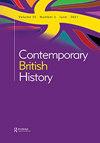Transition of power: the problems of Britain’s post-imperial relationship with Malta, 1964-1971
IF 0.5
2区 历史学
Q1 HISTORY
引用次数: 1
Abstract
ABSTRACT There is growing recognition that the end of formal empire did not equate with the ending of ties between the imperial power and its erstwhile dependencies. This was especially so of the ‘fortress colony’ of Malta which following constitutional separation from Britain in September 1964 remained firmly linked to Britain economically and militarily. The existing historiography suggests that Britain actively sought to maintain imperial connections after decolonisation, even to the extent of attempting to convert formal empire into informal influence. The case of Malta, by contrast, indicates that the remaining imperial ties proved increasingly vexatious for Britain which sought either to limit its liabilities or even transfer them to its NATO allies. For their part, the Maltese proved adept at manipulating, cajoling, and even threatening the former imperial power to maintain and even increase its commitments to the island, especially in the military and financial fields.权力交接:1964-1971年英国与马耳他的后帝国关系问题
越来越多的人认识到,正式帝国的终结并不等同于皇权与其昔日附属国之间关系的终结。“堡垒殖民地”马耳他尤其如此。1964年9月,马耳他根据宪法与英国分离,但在经济和军事上仍与英国紧密相连。现有的史学表明,英国在非殖民化后积极寻求维持帝国关系,甚至试图将正式的帝国转变为非正式的影响力。相比之下,马耳他的情况表明,对英国来说,现存的帝国关系越来越令人烦恼,英国要么寻求限制其责任,要么甚至将其转移给北约盟国。对于马耳他人来说,事实证明他们善于操纵、哄骗甚至威胁这个前帝国力量,以维持甚至增加对该岛的承诺,特别是在军事和金融领域。
本文章由计算机程序翻译,如有差异,请以英文原文为准。
求助全文
约1分钟内获得全文
求助全文
来源期刊

Contemporary British History
HISTORY-
CiteScore
1.40
自引率
14.30%
发文量
34
期刊介绍:
Contemporary British History offers innovative new research on any aspect of British history - foreign, Commonwealth, political, social, cultural or economic - dealing with the period since the First World War. The editors welcome work which involves cross-disciplinary insights, as the journal seeks to reflect the work of all those interested in the recent past in Britain, whatever their subject specialism. Work which places contemporary Britain within a comparative (whether historical or international) context is also encouraged. In addition to articles, the journal regularly features interviews and profiles, archive reports, and a substantial review section.
 求助内容:
求助内容: 应助结果提醒方式:
应助结果提醒方式:


